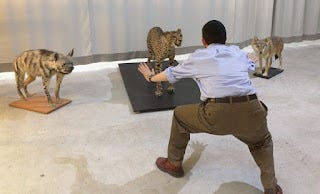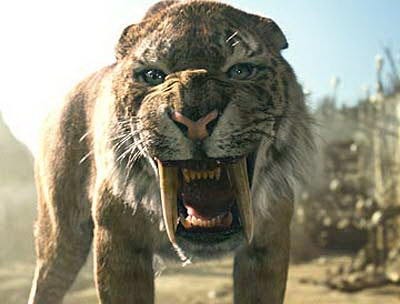Confronting Dinosaurs
How do you evaluate whether a professed expert on Torah and science is worth his salt? One step (of many) is to see whether he is ready to confront dinosaurs.

I don't mean whether he is ready to jump into an enclosure of cloned velociraptors and stare them down. (I wouldn't do that, either.) Rather, I'm talking about whether he is ready (and has already thought about) some very basic questions. Like, when the dinosaurs live? Did they live at the same time as people? Did they all live at the same time as each other? And if so, why are their fossils consistently found in different layers of rock?

Interestingly, the Christian Young Earth Creationists (YECs) are eager to confront dinosaurs. At the $27 million Creation museum in Kentucky, there are prominent animatronic dinosaur exhibits, complete with models of the humans that the Christian creationists believe lived alongside the dinosaurs. (As far as I know, they do not explain why the thousands of dinosaurs fossils are all found in layers of rock that do not have fossils of humans or modern animals.) The Christian YECs are interested and excited to talk about dinosaurs from within their religious worldview, in which they are very confident.
Yet there is no parallel to this amongst Orthodox Jewish YECs. Whether they ultimately claim that dinosaur bones are an incredible work of art created by God, or that they lived before the Flood, one finds that Orthodox YECs simply do not want to discuss the topic at all. This is especially significant in that dinosaurs are probably the most basic of all Torah-science questions. In fact, this is one of the reasons why I put a photo of the skeleton of a Tyrannosaurus rex on the cover of The Challenge Of Creation - not just to scare away charedi readers, but also to stress that I am willing to confront dinosaurs.

Perhaps the most striking example of this aversion to confronting dinosaurs is with Rabbi Moshe Meiselman's Torah, Chazal and Science. Despite the book being over eight hundred pages long, it does not once discuss dinosaurs!
The only reference to dinosaurs at all in Rabbi Meiselman's book appears on p. 531, where Rabbi Meiselman rejects the approach of the Tiferes Yisrael that dinosaurs are from a previous epoch. He also indirectly expresses a viewpoint on dinosaurs in a footnote on p. 500, where he refers to a change in animal behavior after the Mabul, and references the Ramban to Bereishis 9:5, which suggests that before the Mabul, animals were all herbivores. That might have been a reasonable suggestion in Ramban's time, but it's simply laughable to propose it seriously today. Is Rabbi Meiselman claiming that Tyrannosaurus rex, velociraptors, and saber-toothed cats all ate grass and leaves?! Aside from the fact that their physiology clearly shows that they were carnivores, we actually have fossilized remnants of their stomach contents and excrement, which show that they were carnivores - as well as a famous fossil of two dinosaurs that died locked in combat.

While Rabbi Meiselman does not explicitly discuss dinosaurs, he does tell us what he believes to be the (only legitimate) approach to the age of the universe. Unfortunately, his approach to this is rather muddled. Often he says vaguely that "time was measured differently back then", which could theoretically mean that there was indeed an age of dinosaurs, but he also insists that it is forbidden to modify traditional beliefs regarding the universe being a few thousand years old (p. 493). He further claims that there is no legitimate scientific evidence challenging this because the laws of nature were different back then and thus all methods of dating the world as being more than a few thousand years old are invalid. Rabbi Meiselman claims that scientists have no way of knowing otherwise, and that all their conclusions are based on an unproven premise that the laws of nature were always constant.
In a previous post, I have noted that the consistency of historical processes is not a presumption of modern science. Rather, it is a conclusion, drawn from observations of the uniformity present in geology and other phenomena. This was the subject of the very first post that ever appeared on this blog, William Smith and the Principal of Faunal Succession.
(In a possible attempt to counter this argument, Rabbi Meiselman claims on p. 504 that the results of a universe that developed under completely different laws of nature over six days perfectly mimic that of a universe that developed under a single set of laws over billions of years! I'm simply lost for words that such a proposal could be put in print, and that a book espousing such a thing can be taken seriously by anyone.)
But aside from all the scientific evidence that the laws of nature were not different back then, what about the dinosaurs? And the therapsids? And the woolly mammoths?

Forget abstract jargon about radioactive decay and cesium atoms. Think about something tangible and familiar, such as animal life. The fossil evidence clearly shows that there were dinosaurs and all kinds of other creatures which lived before people (since no fossils of contemporary creatures are found in the same strata). These animals lived and died and fought and ate and bred - we even find dinosaur nesting sites. Did all that happen in the space of twelve hours? Did it happen in a universe in which the laws of gravity, the speed of light, and everything else - the very fabric of natural law - was drastically different from what we see today?
And it's not as though there was only one period of prehistoric creatures. The fossil record shows beyond doubt that there were numerous distinct periods. The therapsids lived before the dinosaurs; the dinosaurs lived before the mammoths. And even among dinosaurs, different layers of rock reveal distinct eras. Stegosaurus, Brachiosaurus and Allosaurus are never found in the same layers of rock as Tyrannosaurus rex, Triceratops, and Velociraptor. The conclusion is that each existed in a different period; the former lived in a period which has been termed the Jurassic, while the latter lived in the Cretaceous period. This is not part of some evil conspiracy by scientists, nor the result of mistakes on their part. Any paleontologist could win instant fame by finding a Tyrannosaurus rex fossil in Jurassic rocks - but nobody has ever done so, which shows that T-Rex lived much later, in the Cretaceous.
We see in the rocks that there were countless generations of all kinds of animals, living in distinct periods, leading ordinary animal lives. This is clearly a process that takes many thousands, even millions of years. To describe it as all occurring in one day is simply ridiculous, unless one is taking the word "day" to mean something other than "day." It is not remotely meaningful to talk about "time being different back then." Countless generations of creatures lived and died, in distinct eras - how is it not legitimate to describe that as taking a long period of time?
In fact, I would say that an even stronger question is, how can you write an 800 page book purporting to present the sole legitimate perspective on these topics, and not even address this most basic of questions? Have you never even thought about it, or are you really that afraid to confront it? If the former, then you have no place presenting yourself as an authority on this topic. If the latter - well, then even the Christians have you beat.
If someone claims to be an authority (and especially if they claim to be the sole authority) on Torah and science, and yet they show that they can't even discuss dinosaurs, then they've been caught with their trousers down.



